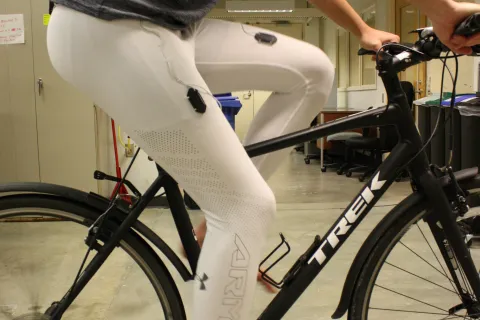UBC wearable technology could change the way Olympic athletes train

Going for the gold is what the Olympics is all about and three UBC entrepreneurs are working to help athletes get closer to the podium.
Kevin Reilly and Behnam Molavi—both PhD engineering graduates from UBC—and sports physician Babak Shadgan have designed a smart garment capable of monitoring vital performance metrics through sensors and software embedded in the fabric. The technology uses near-infrared spectroscopy to measure the local metabolism of an athlete’s muscles.
“With our technology, coaches know how fast their athletes are burning energy and how much fuel they have left in their tank—giving coaches a competitive edge by allowing them to change their strategy in real time,” said Reilly.
He added that the system can provide direct insight as to how well athletes are recovering, whether they’re at risk of injury, and whether they are physically prepared for competition, so the team can ensure their athletes are at peak health and performance.
“If an athlete is injured, the coach can see how the injury is progressing and they can steer a middle course between being too conservative or too aggressive in their training programs,” added Reilly.
Dr. Shadgan, who has worked with Olympic athletes for the last 15 years and also heads the United World Wrestling Medical Commission, knows firsthand how important this information can be to an athlete’s success.
“When athletes, especially those at the elite level, are pushing their bodies hard in training and competition, it’s vital to have direct measures of their muscle metabolism, fitness, and health so that the signs of over-reach and overuse can be identified before they become injuries,” says Dr. Shadgan.
The team is working with the Burnaby Hockey Academy, University of Northern British Columbia sport scientists, and other Canadian athletes to perfect its wearable prototypes, with a final production prototype projected to be ready by the fall of 2018.
Reilly, Molavi and Shadgan formed Pathonix Innovations Inc. in 2013 to work on the core technology. Four years later, they shifted their expertise toward creating a sport-specific product with the help of the entrepreneurship@UBC program.
“The support we’ve received from e@UBC’s Lean Launch Pad program and, currently, the Hatch incubator has been a critical part of our success,” said Reilly. “Hatch connected us with the training, mentorship and resources that hardware startups desperately need and fail without.”